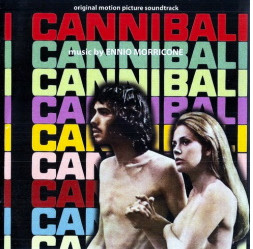主页--->m-comment-000--->mb-comment-009-90
|
电脑版 |
|||||||||||||||||||||||||||||||||
布罗克斯顿评说莫里康内 MB-009-90 |
||||||||||||||||||||||||||||||||||
FA6903 I cannibali / The Year of the Cannibals / 食人魔 / 食人族年 |
||||||||||||||||||||||||||||||||||
作者 乔纳森·布罗克斯顿 (Jonathan Broxton) |
||||||||||||||||||||||||||||||||||
ENNIO MORRICONE 评论,第9部分 009-90 |
||||||||||||||||||||||||||||||||||
 |
||||||||||||||||||||||||||||||||||
食人族 (1970) 《食人族》是一部历史史诗剧情片,由莉莲娜·卡瓦尼执导,改编自剧作家索福克勒斯的经典希腊悲剧《安提戈涅》。这部电影由布里特·埃克兰饰演俄狄浦斯国王和约卡斯塔王后的女儿安提戈涅,她在父亲去世后回到了家乡,表面上是为了阻止关于她兄弟死亡的预言成真。然而,当她到达时,她发现王位已被她的叔叔克瑞翁夺取,她的兄弟们已经死了,城市的街道上到处都是尸体——克瑞翁下令不要埋葬尸体,以警告城内任何潜在的叛乱分子。然而,安提戈涅仍然试图埋葬她的兄弟们,引发了与她叔叔的对抗,这对所有人产生了可怕的后果。 《食人族》是卡瓦尼和莫里康内继1968年伽利略之后的三次合作中的第二次。配乐以一首真正奇异的流行歌曲“食人族”开场,由主唱唐·鲍威尔(Don Powell)用英语以原始朋克摇滚的强度演唱。歌词真的很离谱(“叫我食人族,我不会死......野蛮的食人族......疯狂的食人族......异教徒食人族...我会骑着我的天蓝色马飞走“)。对于这部电影的背景来说,这绝对是不合时宜的,而且在上下文中完全是疯狂的,但它也完全植根于典型的莫里康内 70 年代的声音,因此可能会吸引奉献者。乐谱后面有几个版本的“食人族”旋律。 最突出的次要主题被称为“生命之歌”,在第二个提示中首先出现了慵懒的休闲摇滚编曲,以突出的哈蒙德管风琴为特色,并拿起了亚历山德罗·亚历山德里尼(Alessandro Alessandrini)的Cantori Moderni的完整合唱团,以至于到最后它与1969年的Queimada中精湛的“Abolição”提示有很多相似之处。这个主题也有几次重述,包括无词人声的加长版本,电钢琴的变奏和更强大的器乐补充。 乐谱的其余部分延续了这种轻摇滚/流行/休息室的脉络,从类似的编曲中产生了不同的旋律理念,包括弦乐、管风琴、吉他、木管乐器、架子鼓打击乐和梦幻般的人声。像“Senza Possiblitá d'Uscita”、堂吉诃德式和鲜花般的“Dove Sei, Dove Siete Voi”和时髦的“Ricerca del Fratello”等线索遵循这些风格,而更乐观和充满活力的“Scherzo Rondo”是一种模拟巴洛克式的钢琴作品,充满了踩镲钹和最终的wa-wa-wa人声。 多年来,I Cannibali 已经发布了一些版本。这里回顾的是 2009 年在意大利 Digitmovies 厂牌上发行的那张,它将最初的 CAM 版本扩展到近一个小时的脚趾敲击迷幻。这一切与古典希腊悲剧和同类相食有什么关系是任何人的猜测,但它仍然莫名其妙地有趣。 曲目列表: 1. Cannibal (Vocal Versione Lunga) (3:56), 2.生命之歌 (Versione Organo) (4:45), 3.Senza Possibilitá d'Uscita (2:10), 4.Dove Sei, Dove Siete Voi (2:17), 5.谐谑曲回旋曲 (2:26), 6.生命之歌 (2:51), 7.Ricerca del Fratello (1:51), 8.玛西娅·德·坎·坎(1:56),9。生命之歌 (Vocal Versione Lunga) (4:48), 10.Dove Sei, Dove Siete Voi (Versione Organo) (2:17), 11.谐谑曲回旋曲 (Versione 2) (2:17), 12.生命之歌 (Versione Piano Elettrico) (2:51), 13.Marcia dei Can Can (Versione 2) (1:17), 14.食人族(摇晃)(1:11),15。生命之歌 (Versione Strumenti) (4:48), 16.Dove Sei, Dove Siete Voi (Versione Oboe) (2:15), 17.生命之歌 (Versione Organo 2) (2:51), 18.食人族 (Versione Chitarra) (3:37).Digitmovies CDDM-128,50分24秒。 |
||||||||||||||||||||||||||||||||||
2021.2.7 |
||||||||||||||||||||||||||||||||||
|
| ||||||||||||||||||||||||||||||||||
以下是原文
| ||||||||||||||||||||||||||||||||||
ENNIO MORRICONE REVIEWS, Part 9-90 |
||||||||||||||||||||||||||||||||||
I CANNIBALI (1970) I Cannibali is a historical epic drama film directed by Liliana Cavani, based on the classic Greek tragedy of Antigone by the playwright Sophocles. The film stars Britt Ekland as Antigone, the daughter of King Oedipus and Queen Jocasta, who returns to her home city following the death of her father, ostensibly to stop a prophecy regarding the deaths of her brothers from coming to pass. However, when she arrives she finds that the throne has been seized by her uncle Creon, that her brothers are already dead, and that the streets of the city are full of dead bodies – bodies that Creon has ordered not to be buried as a warning to any potential rebels within the city. However, Antigone still tries to bury her brothers, sparking a confrontation with her uncle that has terrible consequences for all. I Cannibali was the second of three collaborations between Cavani and Morricone, after Galileo in 1968. The score opens with a truly bizarre pop song, “Cannibal,” performed in English with proto punk-rock intensity by vocalist Don Powell. The lyrics are truly outrageous (“call me a cannibal, I won’t die… savage cannibal… crazy cannibal… pagan cannibal… I’ll just fly away on my sky blue horse”). It’s absolutely anachronistic for the film’s setting, and utterly bonkers in context, but it’s also completely rooted in that quintessential Morricone 70s sound, and so will likely appeal to devotees. There are several versions of the “Cannibal” melody later in the score. The most prominent secondary theme is called “Song of Life,” and first appears a languid lounge-rock arrangement in the second cue featuring a prominent Hammond organ, and picks up the full choir of Alessandro Alessandrini’s Cantori Moderni, so much so that by the end it shares a lot of similarity with the superb ‘Abolição” cue from 1969’s Queimada. There are several restatements of this theme too, including a longer version for wordless vocals, and variations for electric piano and a more robust instrumental complement. The rest of the score continues very much in this light rock/pop/lounge vein, with different melodic ideas emerging from similar arrangements comprising strings, organs, guitars, woodwinds, drum kit percussion, and dream-like vocals. Cues like “Senza Possiblitá d’Uscita,” the quixotic and flower-powery “Dove Sei, Dove Siete Voi,” and the groovy “Ricerca del Fratello” follow these stylistics, while the more upbeat and energetic “Scherzo Rondo” is a sort of mock-baroque piano piece enlivened with hi-hat cymbals and, eventually, wa-wa-wa vocals. There have been a few releases of I Cannibali over the years. The one reviewed here is the one released on the Italian Digitmovies label in 2009, which expands the original CAM release to almost an hour of toe-tapping psychedelia. Quite what all this has to do with classical Greek tragedy and cannibalism is anyone’s guess, but it’s inexplicably entertaining, nonetheless. Track Listing: 1. Cannibal (Vocal Versione Lunga) (3:56), 2. Song of Life (Versione Organo) (4:45), 3. Senza Possibilitá d’Uscita (2:10), 4. Dove Sei, Dove Siete Voi (2:17), 5. Scherzo Rondo (2:26), 6. Song of Life (2:51), 7. Ricerca del Fratello (1:51), 8. Marcia dei Can Can (1:56), 9. Song of Life (Vocal Versione Lunga) (4:48), 10. Dove Sei, Dove Siete Voi (Versione Organo) (2:17), 11. Scherzo Rondo (Versione 2) (2:17), 12. Song of Life (Versione Piano Elettrico) (2:51), 13. Marcia dei Can Can (Versione 2) (1:17), 14. Cannibal (Shake) (1:11), 15. Song of Life (Versione Strumenti) (4:48), 16. Dove Sei, Dove Siete Voi (Versione Oboe) (2:15), 17. Song of Life (Versione Organo 2) (2:51), 18. Cannibal (Versione Chitarra) (3:37). Digitmovies CDDM-128, 50 minutes 24 seconds. |
||||||||||||||||||||||||||||||||||
Feb. 7, 2020 |
||||||||||||||||||||||||||||||||||
本站电影欣赏 |
||||||||||||||||||||||||||||||||||
在线音乐试听 |
||||||||||||||||||||||||||||||||||
|
||||||||||||||||||||||||||||||||||
 |
||||||||||||||||||||||||||||||||||
Jon 是一位电影音乐评论家和记者,自 1997 年以来一直担任全球最受欢迎的英语电影音乐网站之一 Movie Music UK 的编辑和首席评论员,并且是国际电影音乐评论家协会 (IFMCA) 的主席。在过去的 20多 年中,Jon 撰写了 3,000 多篇评论和文章,并进行了多次作曲家采访。在杂志刊物方面,乔恩曾为《电影配乐月刊》、《原声带杂志》和《电影音乐》等出版物撰写评论和文章,并为普罗米修斯唱片公司的两张经典 Basil Poledouris 配乐专辑《Amanda》和《Flyers / Fire on the Mountain》撰写了衬垫注释。他还为汤姆·胡佛 (Tom Hoover) 于 2011 年出版的《Soundtrack Nation: Interviews with Today's Top Professionals in Film, Videogame, and Television Scorering》一书撰写了一章。在1990年代后期,乔恩是伦敦皇家爱乐乐团的电影音乐顾问,并与他们合作拍摄了约翰·德布尼(John Debney)的音乐电影《相对价值》(Relative Values)和奥利弗·海斯(Oliver Heise)的音乐《佛陀的指环》(The Ring of the Buddha),以及与兰迪·纽曼(Randy Newman)合作的一系列音乐会。2012年,乔恩在波兰克拉科夫举行的第五届年度电影音乐节上担任“电影节学院”主席。他是作曲家和作词家协会的成员,该协会是作曲家、作词家和词曲作者从事电影、电视和多媒体工作的首要非营利组织。 |
||||||||||||||||||||||||||||||||||
2023.12.10 |
||||||||||||||||||||||||||||||||||
2023 手机版 |
||||||||||||||||||||||||||||||||||
|
||||||||||||||||||||||||||||||||||













